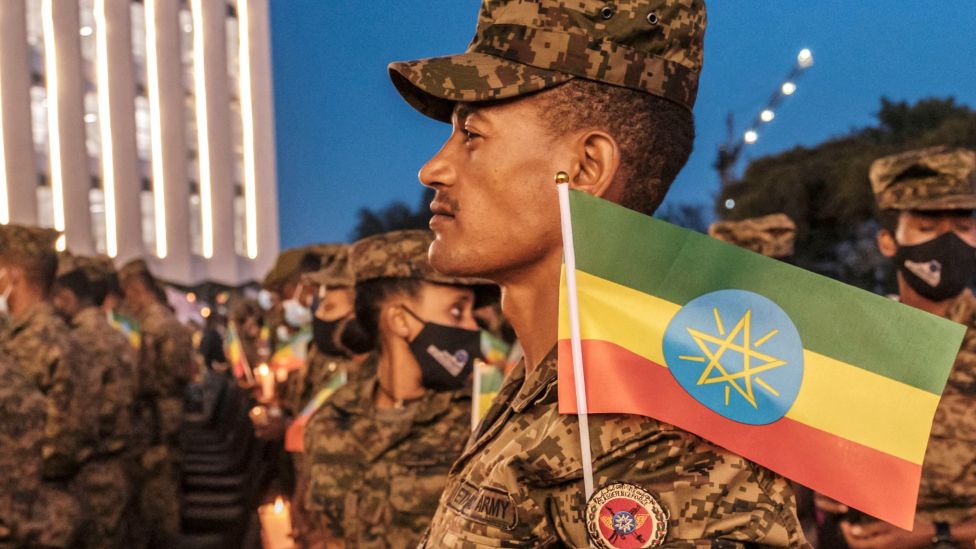In a major move to end the two-year fighting between the Ethiopian military and Tigray rebels, the two sides, on November 2, signed an agreement to end hostilities in the Tigray region.
The agreement, signed in Pretoria, the South African capital, provided that the two sides would immediately end fighting and ensure a systematic, orderly, smooth and coordinated disarmament.
The talks were brokered by former Nigerian President Olusegun Obasanjo, former Kenyan President Uhuru Kenyatta and a former South African deputy president, Phumzile Mlambo-Ngcuka.
In a sign that this time the agreement is going to hold, officials of the two sides, at another meeting in Nairobi, Kenya, agreed to the opening of humanitarian corridors to facilitate the delivery of food and other essentials to millions of civilians caught in the conflict.
Under the agreement, senior commanders of the Ethiopian government and the Tigray People’s Liberation Front (TPLF) agreed to facilitate humanitarian access in conflict-hit parts.
The parties also agreed to promote unhindered humanitarian access for all in need in Tigray and neighbouring regions, and facilitate the movement of humanitarian aid workers, the Africa Union, which is the facilitator of the meeting, said in a statement.
In his reaction to the agreement, UN Secretary-General Antonio Guterres urged parties to the conflict to take concrete steps to implement the peace agreement.
The secretary-general called on the parties to “move ahead as a matter of urgency in translating this agreement into concrete improvements for civilians on the ground,” including accelerating the facilitation of humanitarian access and the restoration of essential services’’.
The two sides have been at war for the last two years, which has left millions in urgent need of humanitarian assistance.
Prime Minister, Abiy Ahmed had, in 2020, sent federal forces to topple the Tigray People’s Liberation Front (TPLF) which controls the regional government, following an alleged attack on a military formation. Ahmed was an ally of the TPLF, who together had been running the government of the country. However, after the 2019 election, the TPLF accused the Prime Minister of sacking its top officials from the government.
The fighting escalated and spread to other neighbouring regions of Amhara and Afar.
The war has so far resulted in the deaths of thousands of people, with more than two million displaced. Both sides have also been accused of the deliberate killing of civilians and blocking humanitarian supplies.
Ethiopia, with more than 112 million people, is the second most populous nation in Africa. However, it is also one of the poorest, with a per capita income of $850. It is currently in dispute with Sudan and Egypt over the Nile River. Hence, any conflict in this country is a great disservice to the ordinary people who are struggling to eke out a living.
It is, therefore, a welcome development that both sides have seen the urgent need to stop the war. We also commend the two sides for setting up a hotline between their two commanders so as to nip any action that is likely to breach the ceasefire.
Daily Trust further commends the efforts of the African Union and Intergovernmental Authority on Development (IGAD) as well as the three facilitators for doing Africa proud. We urge the Ethiopian government, the TPLF and other African leaders who often allow themselves to be used by foreign powers to cause conflict at home to learn something from how the west abandoned Ethiopia immediately the Ukrainian war erupted.
It is indeed important for all to note that the task of ensuring lasting peace in a region that has suffered so much devastation for many years has just begun.
The AU, IGAD, UN and all other relevant bodies and organisations must ensure that both sides adhere strictly to the terms of the agreement. It should be made clear to individuals responsible that each will personally be held accountable in case of any breach of any term of the agreement.
The AU, UN and IGAD must also continue to facilitate the peace process and ensure effective monitoring of its implementation. The international community also has a duty to the mass population of Tigray to ensure the people get the much needed support and assistance in food, medicines and other basic requirements.
We call on both sides, especially Prime Minister Abiy Ahmed, who is a Nobel laureate, to in the interest of their people and Africa, ensure this agreement succeeds.
Ahmed must keep his words at the signing of the peace accord where he said: “We have to bring peace, development and ensure Ethiopia’s prosperity, so we make those forces that (cause) conflict among Ethiopians from afar feel shame.”
“If a victory found in war isn’t repeated in peace, if the peace found through victory isn’t repeated with prosperity, Ethiopia’s existence/sovereignty will inevitably be violated one way or another.”
Ethiopia, which hosts the headquarters of the AU, must not be allowed to go back into any war that only causes its citizens poverty, disease and displacement.

 Join Daily Trust WhatsApp Community For Quick Access To News and Happenings Around You.
Join Daily Trust WhatsApp Community For Quick Access To News and Happenings Around You.


